Oussella loop
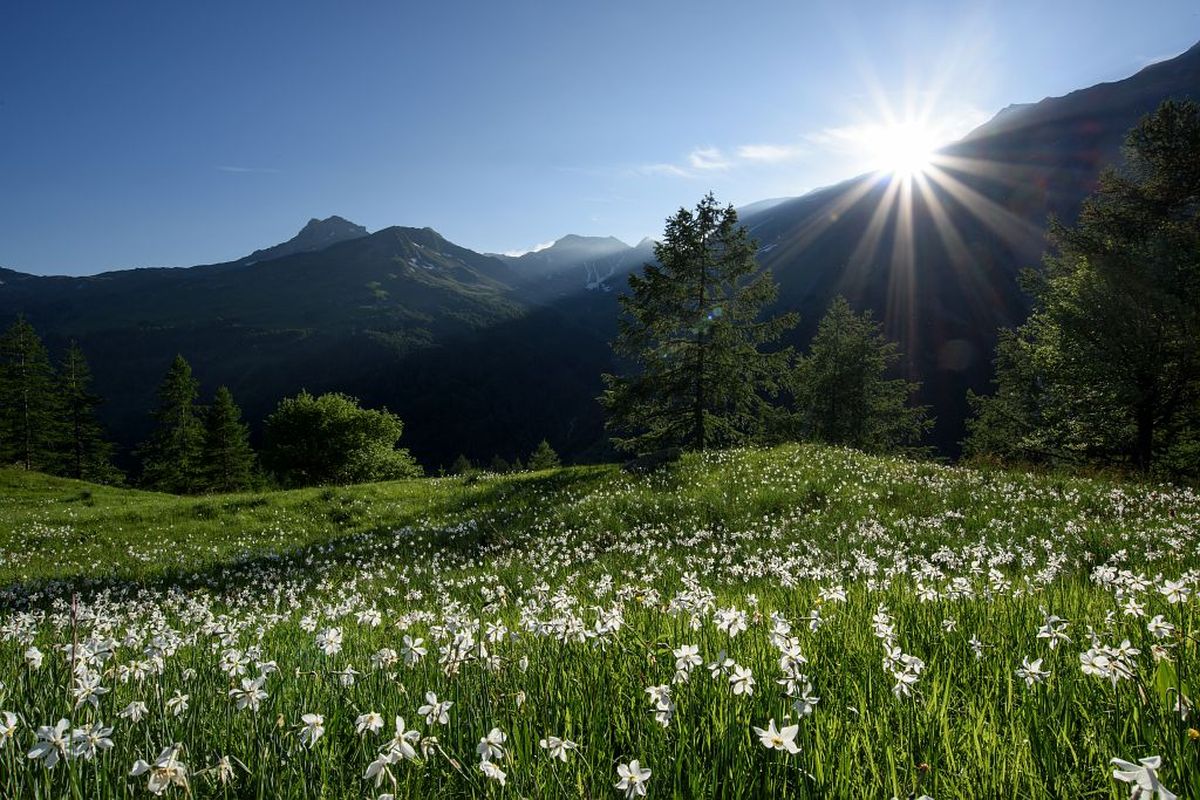
Réallon Easy
Easy
Oussella loop
3h
6,6km
+417m
-413m
Loop
Embed this item to access it offline
The climb begins in the cool of a beech wood, then a beautiful larch forest, before arriving at old hay meadows, testimony to past activities. The ruins of old mountain chalets are a reminder of life in days gone by in the mountains. When the path passes over a balcony, the landscape opens up to offer a wide view of the Réallon valley.
Description
From the car park, cross the bridge, and at the crossroads in the hamlet head up the road towards Chargès as far as the last house.
- Take the path on the right towards Oussella
- After the Marmite de Géant and the bridge, continue left towards l’ Oussella. Cross the waterfall stream and keep to the main path through the beech forest. After a few hairpin bends, at the end of the larch grove, cross the old hay meadows and a stream. Cross the ravine and the stream of La Pissarotte to reach the foot of another area of old meadows that you need to ascend (cairns and arrow).
- Turn right and go as far as the crossroads (post), which is the end of the ascent and a viewpoint. Follow Les Gourniers via Le Villard. Pass the old alpine chalets and Fouents (viewpoint) and descend towards Le Villard. Head along the edge of the ravine to the post (right arrow). After the series of hairpin bends, turn right in the field before the drinking troughs, then left 50 metres further down (small arrow post). Head alongside the “rock hutch” and continue along small hairpins (cairns). Cross the coombe and join the Sentier du Fort.
- Take the path on the right towards Les Gourniers.
- When you reach the track, follow Les Gourniers to the right (red and white GR markings).
- At the top of a rise, leave the track by continuing straight ahead (post with arrow). Stay on the GR until you reach the road back to the car park.
- Departure : Parking des Gourniers, Réallon
- Arrival : Parking des Gourniers, Réallon
- Towns crossed : Réallon
9 points of interest
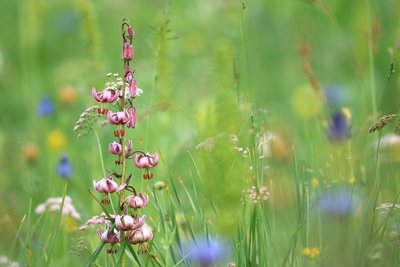
Lis martagon - Marc Corail © Parc national des Ecrins  Flora
FloraMartagon lily
In the undergrowth at the start of the route, it is remarkable for its long, upright flowering stem. It has three to ten purplish-pink flowers dotted with purple, with long orange stamens. But admire it without breathing it in, because it's as smelly as it is beautiful!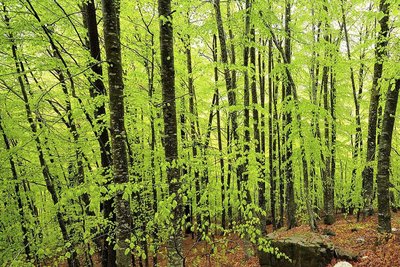
Hêtraie - Mireille Coulon © Parc national des Ecrins  Flora
FloraBeech wood
These beech trees are almost the last to grow up the Durance valley. This tree can reach a height of 40m, with a smooth, slender, steel-grey trunk, horizontal branches and oval, full leaves with wavy edges and cilia. The fruits, called beechnuts, are encased in a spiky husk which opens in early autumn.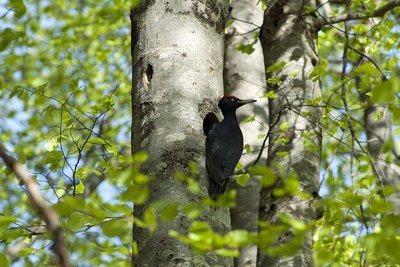
Pic noir à sa loge - Mireille Coulon © Parc national des Ecrins  Fauna
FaunaBlack woodpecker
This funny black bird with a red helmet and a long clear beak is the largest woodpecker in the Alps. It is hard to spot because it is very solitary and wary. Yet thanks to the many clues that reveal its presence, it is possible to identify its song and its very typical, sonorous calls. It pecks tirelessly to defend its territory or to find bark beetles or carpenter ants.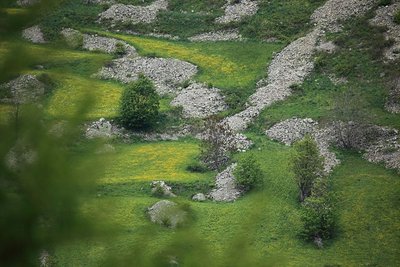
Anciens près de fauche - Clapiers d'épierrement - Marc Corail © Parc national des Ecrins  History
HistoryFormer hay meadows and “rock hutches”
In the former hay meadows we passed through, the low walls and rock hutches bear witness to centuries of work by mountain dwellers. The stones removed from the fields would be piled up on the outskirts. The cut hay was taken down to the village in cloth sacks, loaded onto mules or sledges or the backs of men.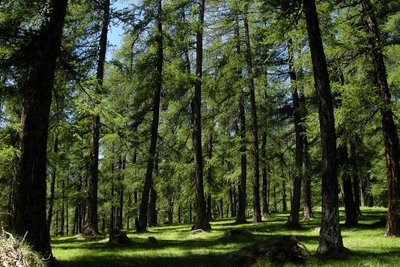
Mélèze - Damien Combrisson © Parc national des Ecrins  Flora
FloraLarch
A high-altitude pioneer tree, its deciduous needles are fine enough to let light through. In autumn, they take on magnificent yellow-orange colours. In spring, its cones are a characteristic dark purple.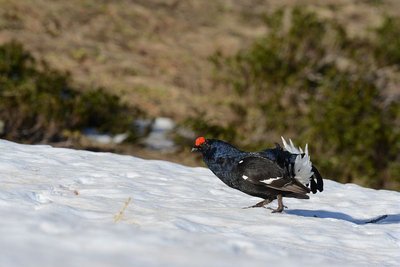
Parade de tétras lyre - Rodolphe Papet © Parc national des Ecrins  Fauna
FaunaBlack Grouse
The black grouse, also known as the "Tetras Lyre", is a member of the galliform family. Of a similar size to a hen, the male boasts black plumage with blue highlights. The tail ends in the shape of a lyre. The more discreet female is dressed in brown and red. In winter, it burrows into the snow to avoid the cold of the night. It can spend long periods in this igloo if the weather is bad.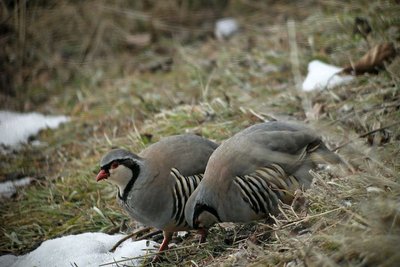
Perdrix bartavelle - Damien Combrisson © Parc national des Ecrins  Fauna
FaunaRock partridge
The rock partridge is a galliform, like the black grouse. Perched on a promontory to sing its staccato song. It is recognisable due to its grey back, striped flanks, white throat and red beak. It lives in the mountains on slopes with good exposure to the sun and is fond of rocks and open moorland, where its young can feed on insects that are vital for their growth.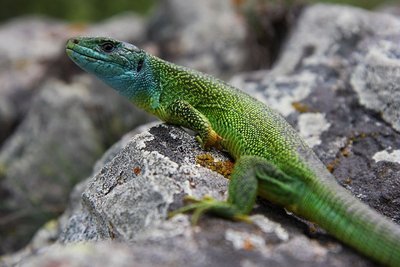
Lézard vert - Damien Combrisson © Parc national des Ecrins  Fauna
FaunaGreen lizard
This large, bright green lizard with black spots can grow to 40 cm. In the breeding season, the male can be distinguished by its blue throat. In the Écrins, it can reach an altitude of 2,000 m on the most exposed slopes. It is active from mid-March to mid-October, with some notable exceptions during mild winters.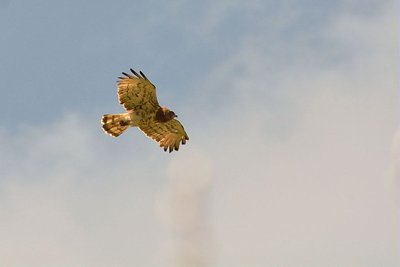
Circaète Jean le Blanc en vol - Mireille Coulon © Parc national des Ecrins  Fauna
FaunaShort-toed Snake Eagle
The Short-toed Snake Eagle is a large bird of prey, easily recognisable by its white underside and large, often chocolate-brown head. But it can be confused with some very light common buzzards. This trans-Saharan migrant feeds mainly on reptiles, which it hunts in steppe areas, scrubland, wasteland and rocky areas, but also in the mountains, even in alpine meadows. Its fairly small nest is often built in pine trees.
Forecast
Altimetric profile
Sensitive areas
Along your trek, you will go through sensitive areas related to the presence of a specific species or environment. In these areas, an appropriate behaviour allows to contribute to their preservation. For detailed information, specific forms are accessible for each area.
Golden eagle
- Impacted practices:
- Aerial, , Vertical
- Sensitivity periods:
- JanFebMarAprMayJunJulAug
- Contact:
- Parc National des Écrins
Julien Charron
julien.charron@ecrins-parcnational.fr
Recommandations
Herd protection dogs
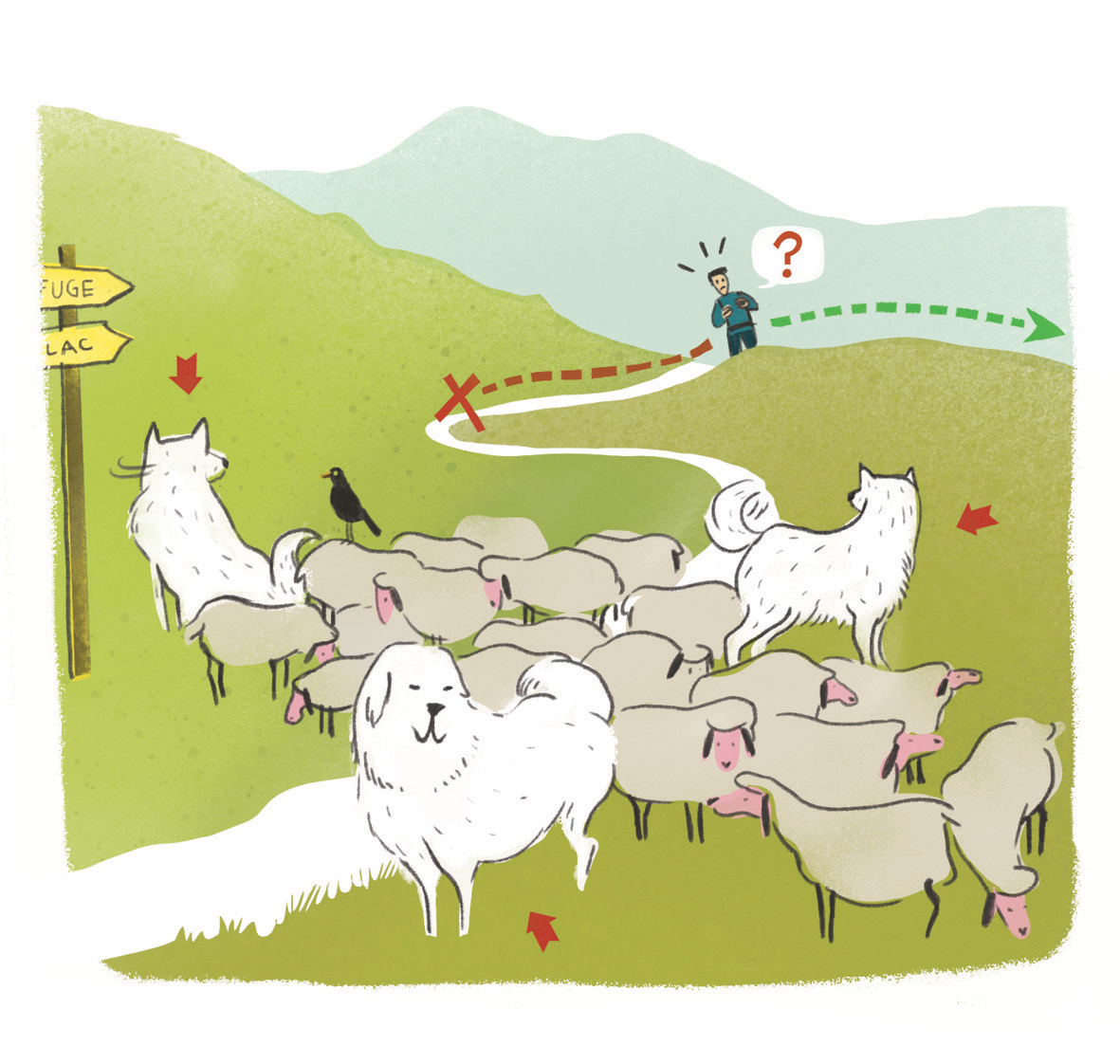 In mountain pastures, protection dogs are there to protect the herds from predators (wolves, etc.).
In mountain pastures, protection dogs are there to protect the herds from predators (wolves, etc.).
When I hike I adapt my behavior by going around the herd and pausing for the dog to identify me.
Find out more about the actions to adopt with the article "Protection dogs: a context and actions to adopt".
Tell us about your meeting by answering this survey.
Information desks
Information center "les Gourniers" (summer only)
Les Gourniers, 05160 Réallon
Les Gourniers
05160 Réallon
Tel :
embrunais@ecrins-parcnational.fr
Maison du Parc de l'Embrunais
Place de l’Église, 05380 Châteauroux-les-Alpes
Information, documentation, exhibition, screenings, products and books of the Park. Accessible to people with reduced mobility. Free admission. All animations of the Park are free unless otherwise stated.
Transport
Consider carpooling: https://www.blablacar.fr/
Access and parking
From Savines-Le-Lac (17 km), take the D41 to Réallon. Follow the D241 to the hamlet of Les Gourniers at the bottom of the valley.
Parking :
Parking des Gourniers, Réallon
More information
Source

Parc national des Ecrinshttps://www.ecrins-parcnational.fr
Report a problem or an error
If you have found an error on this page or if you have noticed any problems during your hike, please report them to us here:


